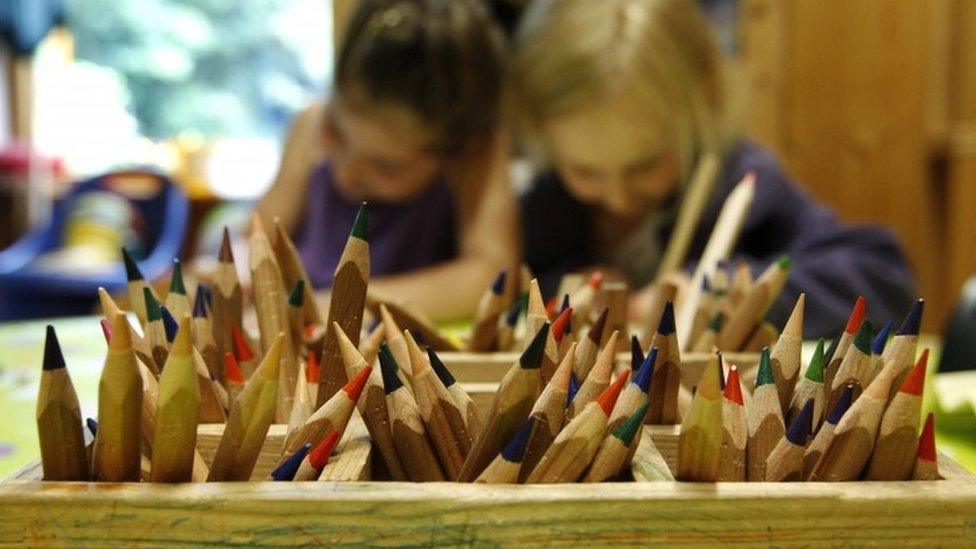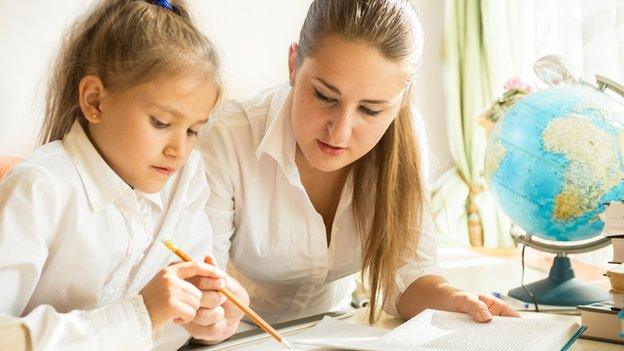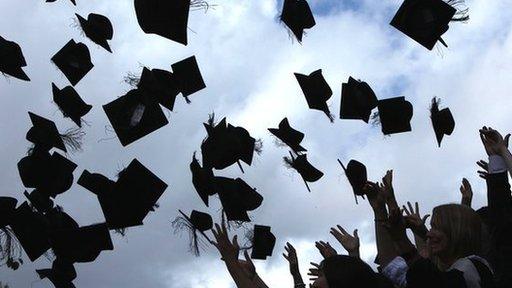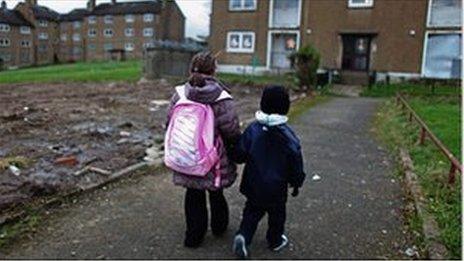Progress on social mobility 'too slow'
- Published

Children develop at very different rates
Progress on closing the gap between rich and poor pupils has not moved fast or far enough to tackle the gulf within a divided Britain, a report says.
The Social Mobility and Child Poverty Commission says the development gap between rich and poor five-year-olds must halve for a more equal society.
It notes that only half the poorest children are deemed ready for school compared to two-thirds of others.
The poorest pupils are still lagging behind by the time they take GCSEs.
The commission notes the poorest pupils are still half as likely to get five good GCSEs as their wealthier peers.
This, in turn, affects their chances of going to more selective universities, the report says.
The commission, chaired by Alan Milburn, calls for more stretching objectives for the early years and a new national definition of school readiness.
Teacher pay
This would encourage early years staff to focus more on preparing young children for school, it says.
Launching his annual report on the state of the nation, Mr Milburn said: "The gap between rhetoric and reality has to be closed if the prime minister's One Nation objective is to be realised.
"Current signs of progress do not go nearly far or fast enough to address the gulf between the divided Britain of the present and the One Nation Britain we aspire to become."
His report calls for a "major new focus" on narrowing the attainment gap and highlights how low ability wealthy children often overtake their brighter, poorer peers during school.
The commission also calls for a rethink of teacher pay and the funding of teacher training.
Social divide
It argues that in order to attract quality graduates "new teacher pay should be improved to compete with other graduate employees".
Fees for initial teacher training should be scrapped and new incentives should be introduced to encourage teachers to move to challenging schools on a trial basis, it suggests.
The report claims there is a growing social divide by income and by class.
"Looking at earnings, the income share of the top 10% has increased from 28% to 39% since 1979, while the income share of the top 1% has more than doubled from 6% to 13% over the same time period," it says.
It adds: "At the very bottom of society there are more than one million children living a life of persistent poverty.
"They are excluded from sharing in the many opportunities that life in modern Britain affords."
'Stronger economy'
A government spokesman said it was committed to an "all-out assault on poverty".
"Our investment in childcare is helping parents get into work and give their children the best start in life, while the pupil premium and school reforms are ensuring every child gets a good education."
The spokesman said work was the best way out of poverty, adding that the number of workless households was at a record low.
He highlighted plans for the new National Living Wage, three million more apprenticeships by 2020, and the funding of 30 hours of free childcare for working parents each week.
The pupil premium, extra cash targeted through schools at the most disadvantaged children, was also highlighted.
"We are absolutely committed to building one nation where nobody is defined by the circumstances of their birth," said the spokesman.
The Child Poverty Action Group said: "Nine school children in every class of 30 is in poverty now and the projections are bleak, with an extra 1.5 million estimated to be below the poverty line by 2020 on current policies."
Kevin Courtney, deputy general secretary of the National Union of Teachers, said: "Setting targets for narrowing the educational attainment gap without addressing its real causes and providing the resources to tackle those in partnership with schools is an abdication of responsibility.
"Once again schools are being left to pick up the pieces on their own."
- Published26 July 2015

- Published30 January 2015

- Published17 October 2013
